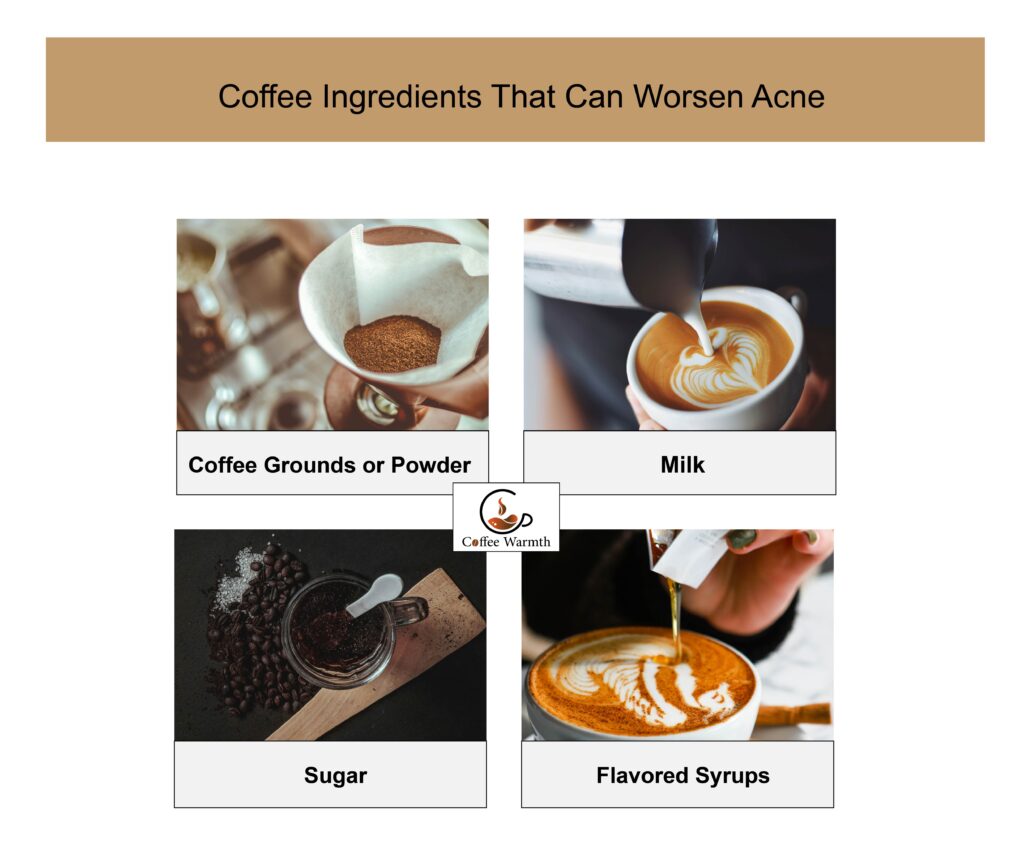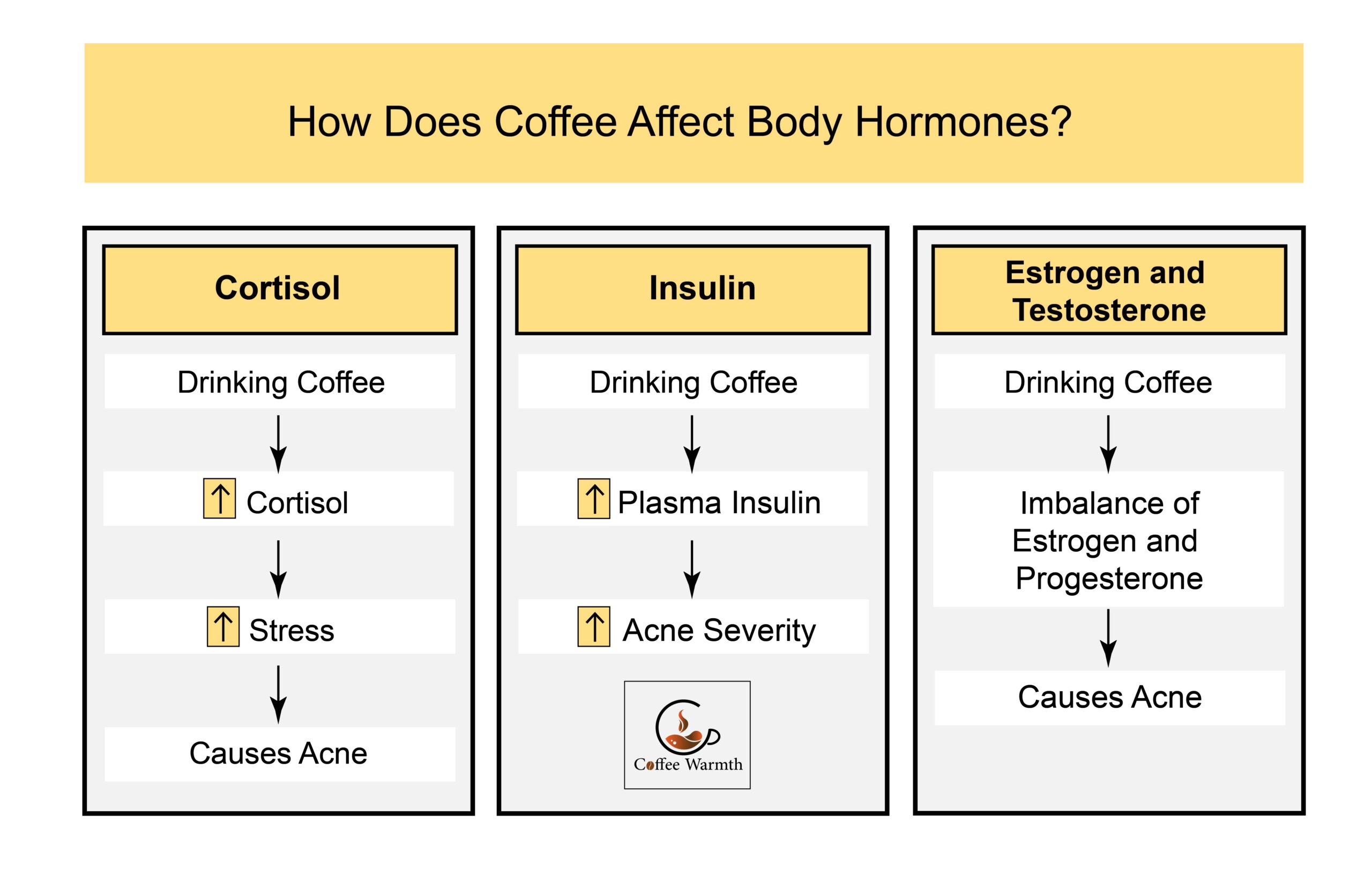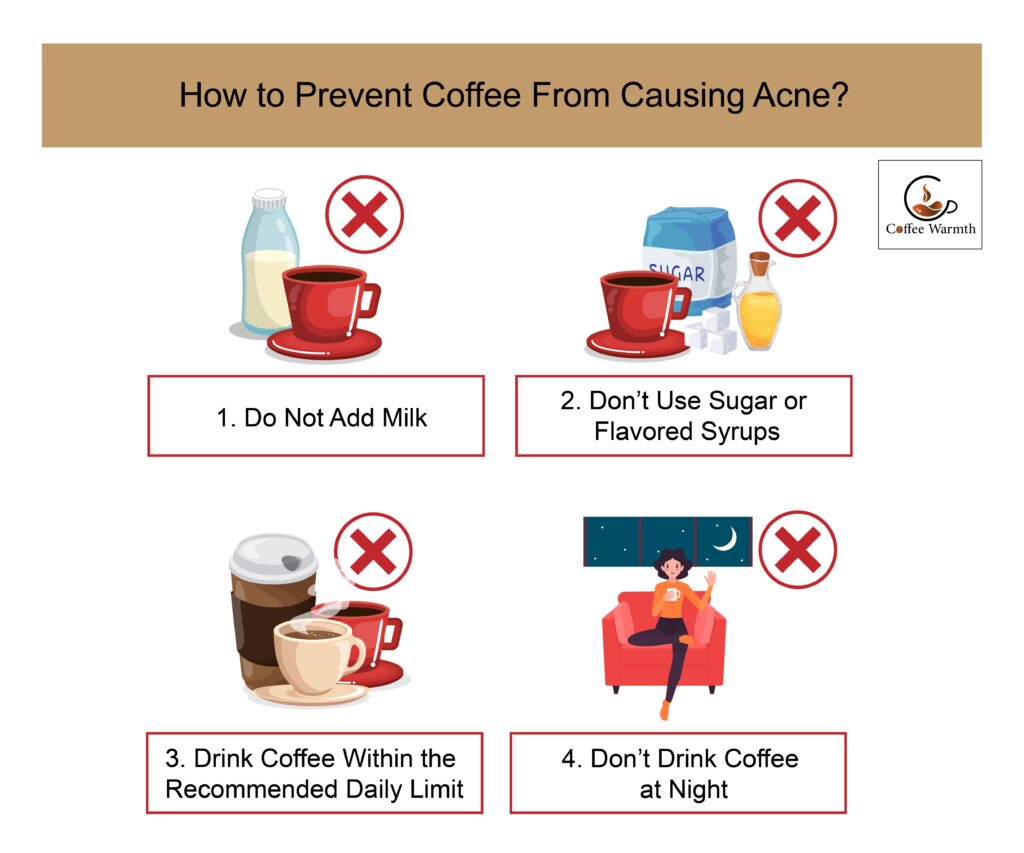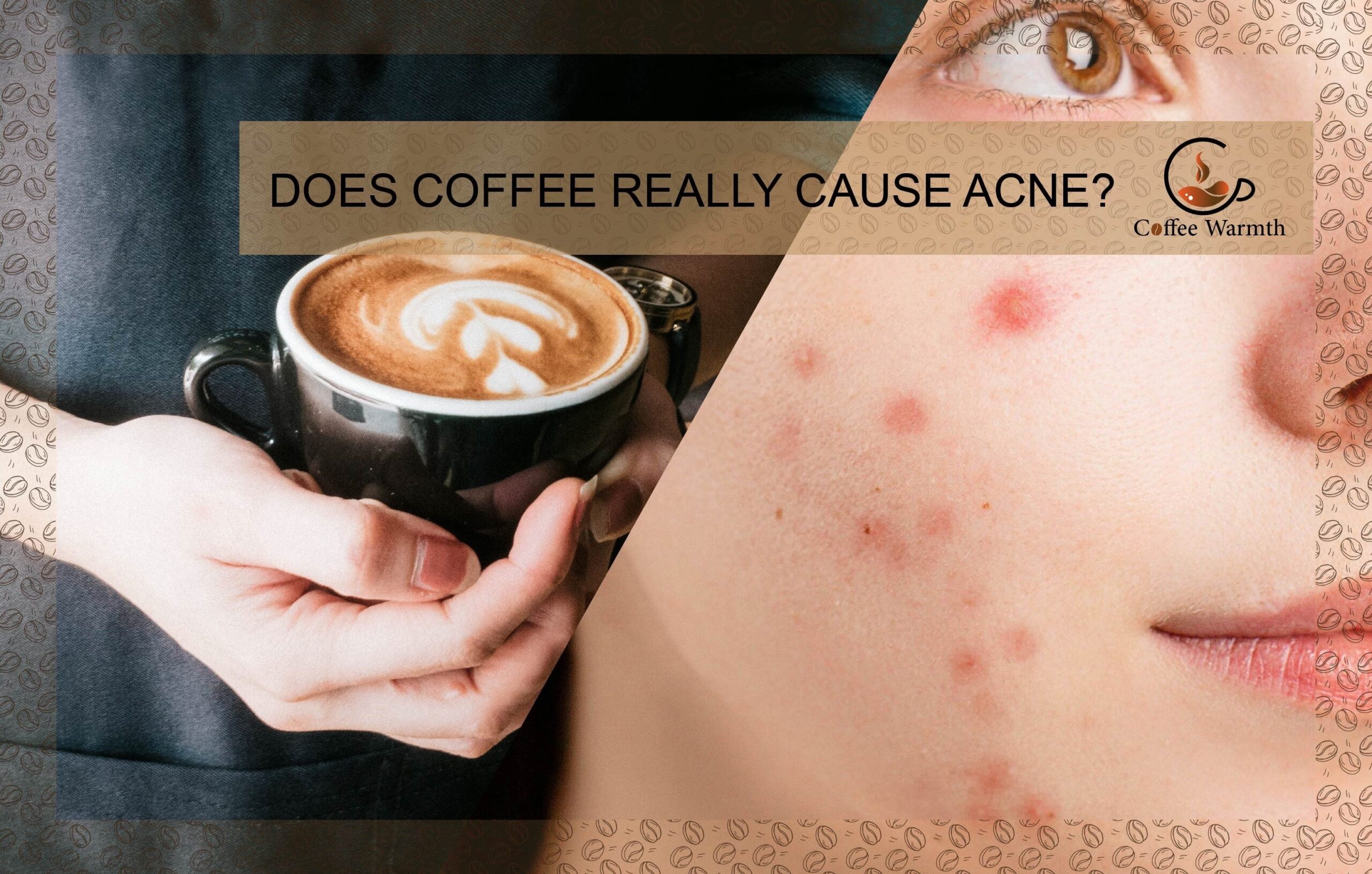No, coffee does not cause acne but it can worsen the existing one. There is no substantial evidence suggesting that coffee can cause acne directly.
Acne is an inflammatory skin disorder characterized by clogged hair follicles beneath the skin, according to the National Institute of Arthritis and Musculoskeletal and Skin Diseases. Hair follicles under the skin are clogged by dead skin cells and sebum, an oil which protects the skin from drying out. Acne can be caused by hormonal changes, excess oil production, stress, and high sugar diet.
Coffee may worsen acne due to hormonal imbalance, sleep deprivation, and the action of caffeine, milk, and sugar on stress hormone, insulin, estrogen, and testosterone. An imbalance in any of these hormones predisposes an individual to acne.
One way drinking coffee may help acne is through its anti-inflammatory property. High amounts of antioxidants fight off the inflammation of acne and reduce its severity. Furthermore, having black coffee, drinking within the daily limit, and avoiding coffee before bed can prevent coffee-induced acne flare ups.
Which coffee ingredients can cause acne?
The coffee ingredients which can worsen acne are coffee grounds or powder, milk, sugar, and flavored syrups.
The main ingredients which you need to make coffee are coffee grounds or powder, water, milk or creamer, sugar, and flavored syrups. The coffee ingredients and their measurements vary depending on the type of coffee drink you are making. The quantity of ingredients affects the incidence and severity of acne in regular consumers.
The figure lists the ingredients in coffee than can cause acne.

Does caffeine cause acne?
No, caffeine does not cause acne but it can trigger other factors that can increase the chances of acne.
- Caffeine increases stress hormone
Drinking coffee first thing in the morning increases stress hormone in the body. Stress has a strong positive relation with acne. Stress increases acne severity and can exacerbate an acne flare as mentioned in a study published in the Clinical, Cosmetic, and Investigational Dermatology.
Caffeine also releases adrenaline which increases stress by activating the ‘fight or flight’ response. This stress situation can contribute to triggering acne.
Christos C Zouboulis and Markus Böhm from Charité University Medicine Berlin states that stress can directly mediate the sebaceous glands releasing an excess of sebum which triggers the development of acne.
- Caffeine reduces sleep quality
Consuming more than 4-5 cups (32-40 fl. oz.) of coffee or 400 mg caffeine in a day or drinking one cup (8 fl. oz.) before bed can disrupt the sleep pattern and reduce sleep quality. Poor sleep quality is linked with increased incidence of acne in adults as found in a study published in the Journal ‘Clocks & Sleep’.
Additionally, poor sleep may increase stress hormone levels and impair sebum regulation which contributes to formation of acne lesions, as concluded by an article in Skin Research and Technology.
Does milk in coffee cause acne?
Yes, milk in coffee causes acne. Milk naturally contains androgenic hormones which can disrupt your hormonal levels and cause acne.
A study conducted on 6,094 teenage girls found that greater the whole or skim milk consumption, the greater was the incidence of acne. This study published in the ‘Dermatology Online Journal’ also found a hormonal imbalance i.e., an increased plasma growth hormone level in the girls.
Clement Adebamowo, Professor at the University of Maryland School of Medicine, and his colleagues state in a study that skim milk consumption in teenage boys has a strong association with acne. They found that milk influences biological factors which affect hormonal levels and contribute to acne.
A meta-analysis published in the Journal of the European Academy of Dermatology and Venereology concludes that high milk consumption was associated with a higher acne incidence as compared to low milk intake.
Does sugar in coffee cause acne?
Yes, sugar in coffee causes acne.
Coffee has a bitter taste so adding white sugar, brown sugar, and flavored syrups is common. Consuming high levels of sugar from coffee can increase the glycemic index. Increased glycemic index is associated with greater incidence of acne as stated by Mary S. Matsui, PhD, an independent consultant in the field of Dermatology and Nutrition.
A research published in 2020 in JAMA Dermatology studied 24,452 participants to understand the association between acne and dietary habits. The results found a strong association between acne and consumption of sugary beverages like coffee and tea.
Loren Cordain and colleagues from Colorado State University conclude in their study that Western diet, highly rich in sugar, is the main culprit of acne vulgaris in some newly modernized societies.
How does coffee affect body hormones?
Coffee affects body hormones like cortisol, insulin, estrogen, and testosterone. An imbalance of any of these hormones can have a negative impact on acne.
Cortisol
Cortisol, also known as stress hormone, is released to combat any stressful situation. However, a cortisol balance is necessary to avoid negative effects on the body.
Drinking coffee in the morning or in excess amounts increases cortisol levels and psychological stress in both healthy men and women, according to a study in ‘Pharmacology Biochemistry and Behavior’. ‘Frequently raised stress levels trigger or aggravate acne by increasing the secretion of sebaceous glands’, says Prof. Dr. Christos Zouboulis.
Insulin
Insulin regulates blood sugar levels. Drinking coffee increases insulin secretion and insulin sensitivity which helps keep sugar level in normal range.
However, increased plasma insulin levels are linked with significantly increased acne severity, as found in a study published in ‘Advances in Dermatology and Allergology’.
Estrogen and Testosterone
Drinking coffee may fluctuate estrogen and testosterone levels in the body that can trigger or exacerbate acne. A systematic review screened 1000 studies and found that an increase in testosterone and a decrease in estrogen causes acne vulgaris.
The image below summarizes how coffee impacts body hormones and its effects on acne.

Can black coffee cause acne?
Whether black coffee can cause acne or not depends on the number of cups per day and time of coffee consumption.
Black coffee has many health benefits like a protective effect on acne because it does not contain milk and sugar. However, drinking black coffee more than the daily recommended intake increases stress hormone which may intensify an existing acne. Furthermore, a cup (8 fl. oz.) of black coffee at night affects sleep cycle which can be a trigger for an acne flare up. Both these factors influence the development of acne in adult females as found in a study published in the Archives of Dermatological Research.
How to prevent coffee from causing acne?
You can prevent coffee from causing acne in the following ways listed in the diagram below.

- Do Not Add Milk
You should avoid adding milk in coffee to stop acne from worsening. Replace your cup of regular milk coffee with a cup of black coffee to hinder offsetting the natural hormones in the body which protect you from an acne flare.
- Don’t Use Sugar or Flavored Syrups
Drink your coffee without white or brown sugar and any flavored additives to keep your glycemic index in a normal range. Controlled glycemic index prevents any diet-related acne flareup.
- Drink Coffee Within the Recommended Daily Limit
Consuming coffee within the FDA daily recommended limit of 4-5 cups diminishes the chances of acne exacerbation which is caused by unsettled stress hormone levels.
- Don’t Drink Coffee at Night
Stop drinking coffee at night to prevent any disturbance in the sleep cycle. A good night’s sleep will have a good effect on the body’s response to acne.
Can coffee help with acne?
Yes, coffee can help with acne if it is consumed in the recommended amount of 4-5 cups a day without sugar and milk.
Drinking coffee is the major source of dietary antioxidants in the US. Antioxidants have an anti-inflammatory and protective effect on the skin. Since acne is characterized by inflammation, antioxidants in the body can fight it off.
Although coffee provides antioxidants, the impact of dietary antioxidants on acne takes time and is not as potent as topical creams containing antioxidants.
